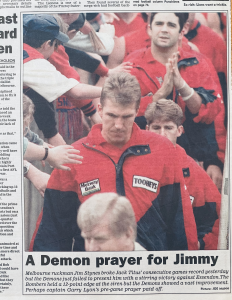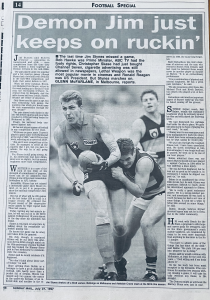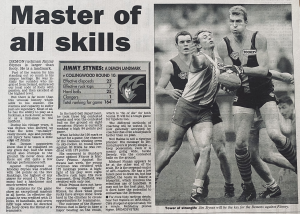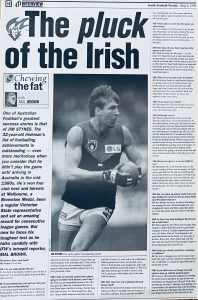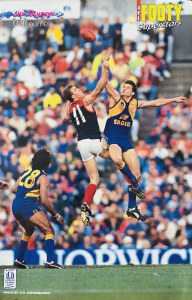
Jim Stynes – 23 April 1966 – 20 March 2012
Nigel Dawe
AS the years go by it gets harder to accept that Jim Stynes is gone, doubly so that it has now been 12-years exactly since this shining light, if not absolute shooting star of an individual passed away, decades too soon – we all might add.
Akin to one of my favourite literary heroes, Albert Camus, who like Jim, died in his mid-40s, you have to wonder what wonderful things were still in store, not just for them as individuals, but for all who knew and loved them, albeit directly benefited from what they did so selflessly, and prodigiously.
But there’s the rub, and as the old saying goes, “It’s not the years in your life, it’s the life in your years” and what Jim managed to pack into his allotment of ‘annual grants’, fully amounts to the grand sum of at least 10 people.
As the Algerian-born Camus (who also made a name for himself in a distant land) once said, which could aptly encapsulate Jim’s own approach to life, “Everything which is alive is ours. All we need to do to become conscious of our task is to open our eyes…What we are, what we have to be, are enough to fill our lives and occupy our strength.”
To say that Jim was a hero of mine is an absolute understatement, and as such, it’s an incredible accompaniment, if not ‘feature’ of my own life that his run of consecutive first grade games for Melbourne kicked off when I was in year 5 of primary school in 1987, and came to an end in my fourth year of university, 11 years later. It’s still mind-boggling to think that he was a playing member of the team I barracked for in every match throughout this period, or 244-games to be precise, an AFL record that will surely never be beaten.
From the start of his career, Jim was a favourite of mine (I was also a ruckman for the teams I played in as a junior) his passion, aggression and approach to the game was something that truly inspired me, and when he won his Brownlow Medal in 1991, I didn’t sleep for a whole week afterwards, I was that excited. To think he’d never picked up an AFL ball until he was 18, and then went on to win the game’s highest award 7-years later, isn’t just an improbable case of ‘selling ice to the eskimos’, it’s more a case of creating a 10-metre-high ice sculpture with a pair of tweezers, in the middle of the Sahara Desert!
Not to mention ruckmen of this era were no lightweights, they all looked far more like menacing villains out of a Bond film. That was until Stynes changed ‘the face’ of this role in every sense; the fact he could run all day and not miss a beat, revolutionised not just the possibilities, but the expectation of what ruckmen ’could do’, right up to this very day. To see any of the modern-day ruckmen go about their business and ply their trade, is to see the pure, polished spectre of Stynes in each of their separate moves and manoeuvres.
One of my favourite memories of Jim Stynes (as a player) was ironically the 1988 Grand Final, a game remembered by most of us, for all the wrong reasons (having lost the match by a then record 90-odd points to Hawthorn). But Jim played his heart out that day, he was the clear best player for Melbourne by an Irish country mile; there’s just something about those that never take a backward step or refuse to submit, and it’s something you never quite see in full, until you observe someone still applying this approach, when all hope is lost.
As if I somehow knew from the beginning that Jim would go on to be not just a great of the Melbourne Football Club, but the entire game itself, I kept a folder of newspaper cuttings and magazine articles related to him. A folder I still dip into from time to time, to remind me of how being the best version of your own self requires giving all you have (and then some) to what you do, because as Jim well knew – it is the only way ‘to reach’ the land of your wildest dreams.
Relatedly, Jim’s fellow Dublin-born, Oscar Wilde once said, “The aim of life is self-development. To realise one’s nature perfectly – that is what each of us is here for.” And as if he were following Wilde’s directive to the very letter, Jim Stynes required only 45-years to perfect a nature so impressive and rare, that we may never see the likes of it again.
May you rest in peace Jim Stynes, and thank you for blessing our lives with the gifts you bestowed upon us, you will never be forgotten.
